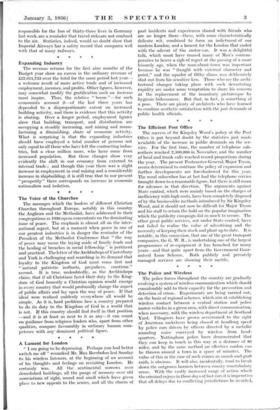A Lament for London "I am going to be depressing.
Perhaps you had better switch me off" remarked Mr. Max Beerbohm last Sunday to his wireless listeners, at the beginning of an account of his thoughts and feelings on revisiting London. He certainly was. All the sentimental sorrows over demolished buildings, all the pangs of memory over old associations of sight, sound and smell which have given place to new appeals to the senses, and all the charm of past incidents and experiences shared with friends who are no longer there—these, with some -characteristically delicate wit, combined to form an indictment of our modern London, and a lament for the London that ended with the advent of the motor-car. It was a delightful talk, which must have caused many of Max's contem- poraries to heave a sigh of regret at the passing of a more leisurely age, when the man-about-town was important because he was "fraught with external character and point," and the squalor of filthy slums was deliberately shut out from his sensitive ken. Those who see the archi- tectural changes taking place with such devastating rapidity are under some temptation to share his concern at the replacement of the insanitary picturesque by hygienic hideousness. But that, in fact, is something of a pose. There are plenty of architects who have learned to combine aesthetic satisfaction with the just demands of public health officials.










































 Previous page
Previous page